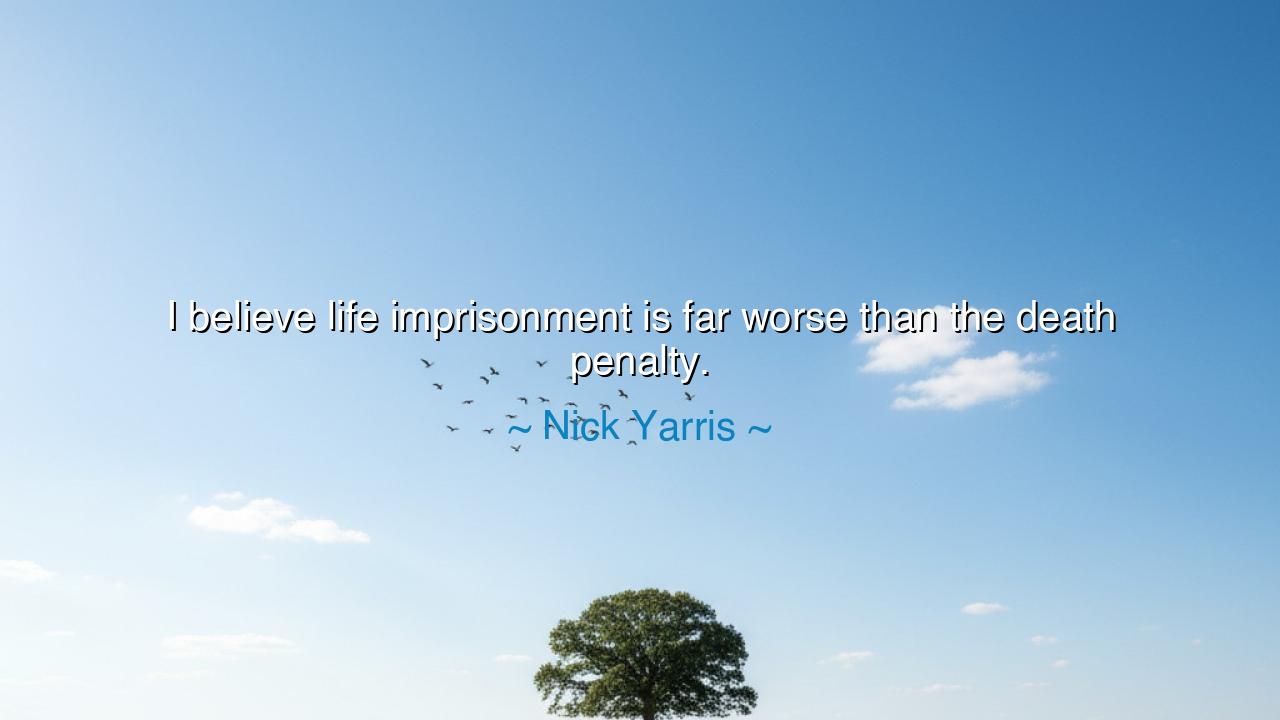
I believe life imprisonment is far worse than the death penalty.






The words of Nick Yarris — “I believe life imprisonment is far worse than the death penalty.” — rise from the depths of a soul that has walked through the valley of despair and returned bearing truth. These are not the words of a philosopher pondering from comfort, nor of a judge weighing abstract justice. They are the confession of one who has lived in the shadow of death, who has felt the iron of chains and the slow erosion of hope. In his statement lies a grief deeper than the grave — the revelation that to exist without freedom, without purpose, without love, is to die each day anew. His voice is not cruel nor vengeful; it is the echo of a man who has known what it means to be forgotten by the world.
In the ancient tongues, the poets spoke often of fate worse than death. They knew that the soul’s torment comes not from the end of life, but from life stripped of meaning. Prometheus, chained to the rock for giving fire to mankind, endured his punishment not in body alone, but in spirit — condemned to an eternity of pain, knowing that his act of compassion had become his curse. So too, Yarris speaks of the agony of imprisonment, where a man’s body remains alive but his world — his family, his dignity, his purpose — fades into memory. Death, to him, was not the enemy; it was release from the slow decay of the human will.
Nick Yarris himself was a man condemned to die for a crime he did not commit. For twenty-one long years he lived in the darkness of death row, surrounded by despair and the echo of closing doors. It was only through the light of truth and the persistence of justice that he was later exonerated. Yet in his reflections after his release, he spoke not of vengeance but of wisdom. He had seen both the physical and spiritual prisons that mankind builds — walls of hatred, fear, and apathy. He knew that life without liberty, without hope or human connection, can crush the soul more completely than any executioner’s hand.
There is something hauntingly honest in his belief. For death is finite — a door that closes. But life imprisonment, especially without hope of redemption, is an unending twilight, where days blur into years and time itself becomes a tormentor. It is not only the walls that imprison, but the silence, the loss of purpose, the slow unraveling of one’s sense of self. The ancients feared this kind of living death. In the myths of Hades, the shades wandered endlessly, longing not for power or riches, but for a single breath of meaning. So too does Yarris’s truth remind us that the body can survive long after the spirit has perished.
Yet within this truth lies a second, more radiant lesson — that freedom of the soul is not merely a condition of the body. Even within confinement, the human spirit has the power to endure, to imagine, to love. Yarris himself found redemption not through escape, but through forgiveness. He chose to rise above the cruelty of fate, to speak of compassion and understanding rather than hatred. In this, he joins the lineage of the wise — those like Nelson Mandela, who endured twenty-seven years in prison and emerged not as a broken man, but as a beacon of peace. Both men prove that while imprisonment may destroy the body, it cannot wholly possess the soul that refuses to yield.
The meaning of Yarris’s words, then, is twofold. It is a condemnation of injustice, but also a meditation on the value of freedom, both physical and spiritual. To live is not merely to breathe; it is to act, to love, to dream, to hope. When these are taken away, existence becomes a hollow shell. The wise, therefore, must cherish their liberty, not as privilege but as sacred duty — to live fully, to seek truth, and to defend the freedom of others who have none. For every man or woman who walks this earth unjustly caged, humanity itself grows a little dimmer.
And so, let the lesson of Nick Yarris echo across generations: guard your freedom as you would guard your soul. Do not waste the days you are given in bitterness or fear. Seek understanding, not vengeance. Fight for justice, but do not let hatred imprison your heart. For though death may come to all, the greater tragedy is to live without purpose — to walk through the years as though already buried. To live rightly, with compassion and integrity, is to ensure that even in suffering, one’s spirit remains free.
Thus, the wisdom of Yarris’s sorrow becomes our inheritance. Life, when stripped of hope, becomes the cruelest punishment. But life, when filled with courage and meaning, becomes the greatest victory — even against the darkness of despair. Cherish your liberty. Guard your conscience. And above all, never let the walls of circumstance bind the wings of your soul.






AAdministratorAdministrator
Welcome, honored guests. Please leave a comment, we will respond soon